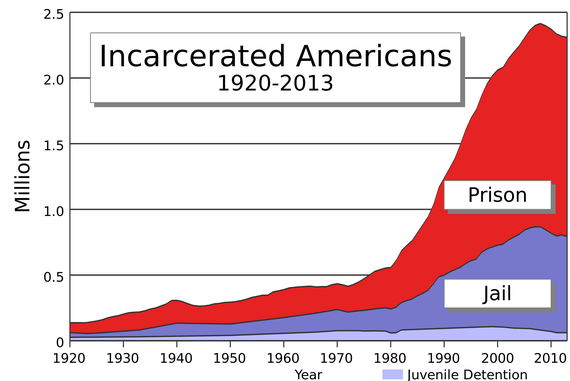Chủ đề Tội ác (Crimes) là một chủ đề khá điển hình trong IELTS Writing Task 2. Đề bài có thể yêu cầu chúng ta bàn luận về một vấn đề, đưa ra quan điểm hay đồng ý hoặc phản đối một luận điểm liên quan đến vấn đề tội phạm, tội ác.
Có rất nhiều vấn đề xoay quanh chủ đề Crimes như vấn đề luật pháp, ảnh hưởng của tội phạm tới cuộc sống người dân, các ý kiến như tại sao những người có tiền án, tiền sự lại rất khó có thể có được một công việc tốt, … Tuy nhiên, lại có ý kiến cho rằng, các nhà tuyển dụng nên tuyển những người có tiền án, tiền sự. Vì sao vậy? Hãy cùng tham khảo bài viết dưới đây để tìm hiểu 5 lí do cơ bản giải thích cho luận điểm này nhé.
Five Bottom Line Reasons Why Employers Should Hire Ex-Felons
There is no city in the nation that’s growing faster than the population of 70 million Americans with criminal records. As one of them, former real estate developer R.L. Pelshaw is determined to turn this costly societal burden into an opportunity.
“With criminal records it’s difficult for many ex-offenders to get jobs making a livable wage,” Pelshaw said. “Showing (ex) criminals how to be successful in legal businesses is far better than returning to crime, and will change the destiny of millions of people.”
For employers, there exists a real opportunity to disrupt the continuous cycle of quarantining humans. And for the sake of society at large, sustainable employment may not only represent our best opportunity to significantly disrupt recidivism and the growing population of Americans with criminal records, it may be our only option.
Consider the costs. Between 1973 and 2009, the nation’s prison population grew by 705 percent. Over the past two decades costs of incarceration have skyrocketed more than 305 percent, according to a 2011 Pew study. States now spend more than $52B out of their budgets (second only to Medicaid), for incarceration. And the economic impact inherent in the process of policing and locking up those who perpetrate crimes in our communities is compounded by the economic impact of high recidivism rates of 84 percent for males, age 24 years and younger. This revolving door is fueled by a pipeline that has grown exponentially over the past several decades to the point where the United States incarcerates more of its population than any nation in the world.

America’s employers must take note of what happens to released inmates when they re-enter society, often after years of being quarantined, and with little hope of finding employment that funds a new path to productive citizenship. In 2012, more than 630,000 inmates were released into targeted communities across America. According to the latest study by the Bureau of Justice, three of every four released prisoners were re-arrested within the five-year life of the study. An extraordinarily high percentage (89 percent) of ex-felons re-arrested were unemployed.
Pelshaw is determined to change that. He launched and self-funded a campaign called, The National Hire Ex-Felons Campaign, designed to inform employers of the benefits of tapping into this 70-million-strong workforce.
Of course, there are plenty of unemployed people who do not commit crimes. The suggestion is not that employment alone is a panacea for this national problem. But, there is no other immediate option to developing sustainable financial stability for ex-felons. The longer that former inmates remain unemployed following release, the greater the risk they will seek income through alternative means. Their fate impacts the fate of families, communities and ultimately society at large.
Employment is one of the tools we have to address this growing problem. Those who pay their debt to society and emerge from prison with a new perspective and lease on life deserve an opportunity to earn a living. They represent a class of prospective employees unlike any other. But, why should employers assume the risk of hiring ex-felons? You may be surprised by these five fact-based, bottom line reasons.
1. Hiring Incentives
Finding good help is a key factor in running a successful business. Too many employers get robbed daily by lazy employees who work with a sense of entitlement, watching the clock, anticipating that moment they can break free of the bonds that trap them in cubicles, offices and warehouses. Many daydream of weekend getaways and play-cations while robotically moving through tasks, diluting the level of worker productivity. Ex-felons are no stranger to hard work. And they are grateful for the opportunity to earn a living. Most believe they have something to prove to their families and employers. But there are additional bottom line incentives to employees who hire former inmates. Substantial tax credits are available for hiring ex-felons, such as the Federal Work Opportunity Tax Credit. Some states even provide partial wage reimbursement, additional tax credits, and other training funds for employers who hire ex-felons.
“We’ve had three (subsidies) that amount to several hundreds of thousands of dollars to bear down on training our employees,” said Mike Hannigan, CEO of Give Something Back. “It’s amazing to me how many resources are available to a company.”
Employers who hire felons can also be eligible to obtain a free fidelity bond funded by the federal government to protect them against employee dishonesty or theft. More importantly, credible studies clearly indicate that ex-felons out of prison seven years or more have no higher rate of committing a crime than non-felons. A 2009 University of Maryland study found that people with a criminal record are at no greater criminal risk after they’ve been out seven to 10 years than those with no record.
2. Employee Reliability
Few things hurt a business more than high turnover rates. Employers who spend too much time with a focus on hiring employees who won’t leave shortly thereafter find themselves neglecting other areas of the business that require attention. Ex-felons have far fewer options than conventional employees. Due to the scarcity of opportunities for ex-felons, many employers that hire them have lower turnover than with conventional hires. According to the Partnership for Safety and Justice, many ex-felons have a favorable employment and educational history. “In general, formerly incarcerated people are as reliable as other workers,” the report states, citing numerous studies.
3. Hiring Opportunity
The landscape of employable ex-felons is large. Ex-offenders on probation often have to maintain employment as a condition of release. Most parolees are drug-tested by their probation officer or halfway house at no expense to employers. Most parole officers and halfway houses welcome contact with employers of supervised felons. That supervision de-risks the employment opportunity and is an added value at no cost to the employer. An estimated 6.9 million persons were under supervision of adult correctional systems in 2013, according to the Bureau of Justice. This is a significant, largely untapped and motivated work force. A 2008 study by the Urban Institute Justice Policy Center found that fewer than 45 percent of felons were employed eight months after being released. In real numbers that means more than 3.5 million prospective workers are available for hire.
4. Economic Impact
Employers can make a considerable difference in transforming a criminal liability into a community asset. Unemployed ex-felons are at a greater risk of re-offending compared to employed ex-felons. Many ex-felons turn to crime and return to jail (recidivism) because they can’t find a job paying a livable wage.
“People who break the law need to be held accountable and pay their debt to society,” said Adam Gelb, director of the Pew Center on the States’ Public Safety Performance Project. “At the same time, the collateral costs of locking up 2.3 million people are piling higher and higher.”
According to VERA institute of Justice, the U.S. spends nearly40 billion a year to house inmates. The average cost per state to house one inmate is31,286 per year. But if that one felon gets a job instead of returning to prison, he or she now contributes to the economy by more than $10,000 a year, according to a Baylor University study.
5. Crime Market Disruption
An estimated 70 million U.S. adults have arrest or conviction records based on Bureau of Justice statistics. Tougher sentencing laws, especially for drug offenses, have swelled that total. Society can’t afford to simply banish 70 million people from the workplace. Children of incarcerated adults are the highest at-risk group in America. Many follow in their parents’ footsteps, continuing the cycle of crime and fueling a criminal market pipeline. Children of felons are seven times more
likely to be incarcerated themselves. They are more likely (23 percent vs 4 percent) to be expelled or suspended from school than other children.
And the criminal market isn’t just isolated to minority populations. Across the nation, 40 percent of young men (regardless of race) will have a police-record encounter before the age of 23. Of those incarcerated, 84 percent will return to prison. It’s a continuous criminal market cycle that costs taxpayers more than $52 billion a year and threatens the stability of families and communities, in particular those already suffering from economic distress. Employing an ex-felon can disrupt the cycle of this criminal market and provides an opportunity to restore stability to families through a solid financial footing.
“To fight the vicious circle of crime and recidivism we need to create ways offenders, ex-offenders, those at risk to offend, and those living off crime (but not yet caught) can make money legitimately,” said Pelshaw, who is also the author of Illegal to Legal: Business Success for (ex) Criminals.
With more than 630,000 inmates released into neighborhoods across America every year, the community of ex-felons released each year is larger than the population of many major cities. Employers are already discovering the challenges of finding good employees without criminal records. Perhaps it’s time employers considered the benefits of hiring good employees who happen to be ex-felons.
(Source: Huffingtonpost)

Vocabulary
| Ordinal Number | Words | Word classes | Phonemic transcription | English definition | Vietnamese definition |
| 1 | criminal record | noun [ C ] | UK /ˌkrɪm.ɪ.nəl ˈrek.ɔːd/
US /ˌkrɪm.ɪ.nəl ˈrek.ɚd/ |
an official record of crimes that a person has committed | hồ sơ tội phạm |
| 2 | offender | noun [ C ] | UK /əˈfen.dər/ US /əˈfen.dɚ/ | a person who is guilty of a crime | người phạm tội (→ex-offender: người đã từng phạm tội) |
| 3 | disrupt | verb [ T ] | UK /dɪsˈrʌpt/ US /dɪsˈrʌpt/ | to prevent something, especially a system, process, or event, from continuing as usual or as expected: | ngăn chặn, phá vỡ |
| 4 | quarantine | noun [ U ] | UK /ˈkwɒr.ən.tiːn/
US /ˈkwɔːr.ən.tiːn/ |
a period of time during which an animal or person that might have a disease is kept away from other people or animals so that the disease cannot spread | sự cách ly kiểm dịch; thời gian cách ly kiểm dịch |
| 5 | recidivism | NOUN
[mass noun] |
/rɪˈsɪdɪvɪz(ə)m/ | The tendency of a convicted criminal to reoffend. | sự tái phạm (tội) |
| 6 | incarceration | NOUN
[mass noun] |
/in,kɑ:sə’reiʃn/ | The state of being confined in prison; imprisonment. | sự bỏ tù, sự tống giam |
| 7 | perpetrate | verb [ T ] | UK /ˈpɜː.pə.treɪt/
US /ˈpɝː.pə.treɪt/ |
to commit a crime or a violent or harmful act | phạm (tội ác…); có tội gây ra (một vụ lừa đảo…) |
| 8 | inmate | noun [ C ] | UK /ˈɪn.meɪt/
US /ˈɪn.meɪt/ |
a person who is kept in a prison or a hospital for people who are mentally ill | người cùng ở (trong bệnh viện, nhà tù…) |
| 9 | tap into sth | phrasal verb with tap | UK /tæp/
US /tæp/ |
to manage to use something in a way that brings good results | sử dụng hoặc khai thác một nguồn tài nguyên phong phú vì lợi ích/lợi nhuận./ Để tận dụng lợi thế của… |
| 10 | panacea | noun [ C usually singular ] | UK /ˌpæn.əˈsiː.ə/
US /ˌpæn.əˈsiː.ə/ |
something that will solve all problems | thuốc bách bệnh, thuốc [chữa] bá chứng |
| 11 | incentives | noun [ C or U ] | UK /ɪnˈsen.tɪv/ US /ɪnˈsen.t̬ɪv/ | something that encourages a person to do something | cái khuyến khích, vật khích lệ |
| 12 | entitlement | noun | UK /ɪnˈtaɪ.təl.mənt/ US /ɪnˈtaɪ.t̬əl.mənt/ | [ C or U ] something that you have a right to do or have, or the right to do or have something | sự cho quyền; sự được quyền |
| 13 | dilute | verb [ T ] | UK /daɪˈluːt/ US /daɪˈluːt/ | to make something less strong or less valuable | (nghĩa bóng) làm giảm, làm yếu đi |
| 14 | tax credit | noun [ C ] | UK /ˈtæks ˌkred.ɪt/
US /ˈtæks ˌkred.ɪt/ |
an amount of money that is taken off the amount of tax you must pay | tín dụng thuế |
| 15 | reimbursement | noun [ C/U ] | /ˌri·əmˈbɜrs·mən/ | the act of paying back, or the money that is paid back | sự hoàn lại, sự hoàn trả |
| 16 | bear down | phrasal verb with bear | US /beər/ | to put more effort into doing something | nỗ lực nhiều hơn để làm điều gì đó |
| 17 | eligible | adjective | UK /ˈel.ɪ.dʒə.bəl/
US /ˈel.ə.dʒə.bəl/ |
aving the necessary qualities or satisfying the necessary conditions | đủ tư cách, thích hợp |
| 18 | fidelity bond | noun [ C ] | UK /fɪˈdel.ə.ti bɒnd/
US /fɪˈdel.ə.t̬i bɑːnd/ |
a company’s insurance protecting it against dishonest or illegal behaviour by employees | giấy bảo đảm lòng trung thực |
| 19 | probation | noun [ U ] | UK /prəˈbeɪ.ʃən/
US /proʊˈbeɪ.ʃən/ |
a period of time when a criminal must behave well and not commit any more crimes in order to avoid being sent to prison | (luật học) sự tạm tha có theo dõi, sự thử thách |
| 20 | parolee | noun | /pərəʊˈliː/ | one released on parole | người được tha theo lời hứa danh dự |
| 21 | parole | noun [ U ] | UK /pəˈrəʊl/
US /pəˈroʊl/ |
permission for a prisoner to be released before their period in prison is finished, with the agreement that they will behave well | (số ít) sự tha [cho tù nhân] sau khi [tù nhân] đã hứa tu tỉnh |
| 22 | halfway house | noun | UK /ˌhɑːf.weɪ ˈhaʊs/
US /ˌhæf.weɪ ˈhaʊs/ |
[ C ] a place where prisoners or people with mental health problems can stay after they leave prison or hospital and before they start to live on their own | ký túc xá hoặc nhà nghỉ cho tù nhân mới được thả; bệnh nhân tâm thần và những người cần thời gian thích nghi trước khi trở về cuộc sống bình thường. |
| 23 | correctional | adjective | UK /kəˈrek.ʃən.əl/ US /kəˈrek.ʃən.əl/ | relating to the punishment and treatment of people who have committed crimes | trừng phạt |
| 24 | untapped | adjective | UK /ʌnˈtæpt/
US /ʌnˈtæpt/ |
If a supply of something valuable is untapped, it is not yet used or taken advantage of | chưa khai thác |
| 25 | conviction | noun | UK /kənˈvɪk.ʃən/
US /kənˈvɪk.ʃən/ |
[ C or U ] the fact of officially being found to be guilty of a particular crime, or the act of officially finding someone guilty | (+ for) sự kết án; án tù |
| 26 | swell | verb | UK /swel/
US /swel/ |
to become larger and rounder than usual; to (cause to) increase in size or amount | [làm] to lên, [làm] tăng thêm |
| 27 | banish | verb [ T ] | UK /ˈbæn.ɪʃ/
US /ˈbæn.ɪʃ/ |
to send someone away, especially from their country, and not allow them to come back | đày đi, trục xuất |
| 28 | vicious | adjective | UK /ˈvɪʃ.əs/
US /ˈvɪʃ.əs/ |
used to describe an object, condition, or remark that causes great physical or emotional pain | xấu xa, độc ác/ hư hỏng/ dữ, nguy hiểm (con vật) |
| 29 | legitimately | adjective | UK /ləˈdʒɪt.ə.mət/
US /ləˈdʒɪt̬.ə.mət/ |
reasonable and acceptable | [một cách] hợp pháp/ hợp lý |
Nguồn từ vựng tham khảo:
Lưu ý:
Các bạn có để ý thấy trên biểu đồ có vẽ hai phần, đó là “prison” và “jail”. Nếu tra từ điển, định nghĩa mà bạn nhận được cho hai khái niệm này thường sẽ là một từ “nhà tù” nói chung. Tuy nhiên thực tế, hai khái niệm này lại có sự khác biệt khá rõ rệt, bởi vậy chúng ta cần phân biệt tránh nhầm lẫn, trong bất kì hoàn cảnh nào, văn nói hay văn viết các bạn nhé.
A jail is used to temporarily detain those who are suspected or convicted of a crime. It is used for the short-term, usually to hold those awaiting trial or to hold those convicted of low-level offenses that have sentences of one year or less.
(“jail” là nơi giam giữ tạm thời những đối tượng đang trong tình trạng nghi vấn hoặc phạm những tội nhẹ, đang trong quá trình chờ xét xử, tạm giam trong vòng dưới một năm đến một năm.)
A prison is a facility that holds convicts who have committed crimes the legal system deems especially serious (e.g., repeated drunk driving offenses, first degree murder) for more long-term sentences.
(“prison” là nơi giam giữ lâu dài những đối tượng phạm tội mà hệ thống pháp lý nhận định là nghiêm trọng như tái phạm việc lái xe khi đang say, giết người cấp độ một.)
Phân tích bài viết
Bài viết đã nêu ra quan điểm: Các nhà tuyển dụng nên tuyển những người có tiền án, tiền sự vào doanh nghiệp của mình. Thoáng qua, quan điểm này dường như có vẻ bất hợp lý, thậm chí là khá vô lý. Nhưng bằng những chứng cứ và lời lẽ đầy tính thuyết phục, tác giả bài viết đã làm sáng tỏ ý kiến của mình. Tác giả đã đưa ra 5 lí do chính vì sao các nhà tuyển dụng lại nên tuyển những người có tiền án, tiền sự:
- Hiring Incentives (Khuyến khích tuyển dụng: Những người có tiền án, tiền sự thường rất trân trọng cơ hội làm việc, họ muốn chứng tỏ cho gia đình, và nhà tuyển dụng về năng lực của họ, vì vậy thường sẽ nhiệt tình hơn những nhân viên không có tiền án, tiền sự)
- Employee Reliability (Độ tin cậy của nhân viên: Tỷ lệ nhảy việc của nhân viên có tiền án, tiền sự thường thấp hơn tỷ lệ nhảy việc của những nhân viên khác)
- Hiring Opportunity (Cơ hội tuyển dụng: Có khá nhiều những người có tiền án, tiền sự, đang được tạm tha hiện đang thất nghiệp, vì thế đây là nguồn lao động dồi dào, cơ hội tuyển dụng của các doanh nghiệp là rất cao)
- Economic Impact (Ảnh hưởng tới nền kinh tế: Nếu những người có tiền án, tiền sự hiện đang trong tình trạng thất nghiệp mà được tuyển dụng, họ sẽ đóng góp được công sức cho xã hội, đồng thời giảm thiểu nguy cơ quay lại con đường phạm tội)
- Crime Market Disruption (Phá vỡ thị trường tội phạm: Xã hội không thể cứ thế mà trục xuất hàng triệu con người ra khỏi lực lượng lao động, chỉ vì họ có tiền án, tiền sự. Hơn nữa, tỷ lệ trẻ em đi theo con đường phạm tội của cha mẹ có tiền án, tiền sự là khá cao. Vì vậy, nếu những người có tiền án, tiền sự này được tuyển dụng, sẽ giảm thiểu nguy cơ quay lại con đường tội phạm của họ, đồng thời ngăn chặn rủi ro đến với tội lỗi của con cái họ)
Câu hỏi
In many cities crime is increasing. Why do you think this is happening? What can governments do to help reduce crime levels? Give reasons for your answer and include any relevant examples from your own knowledge or experience. You should spend 40 minutes on this task. Write at least 250 words.
Bạn hãy comment cùng trao đổi phía dưới với chúng mình nhé.






















